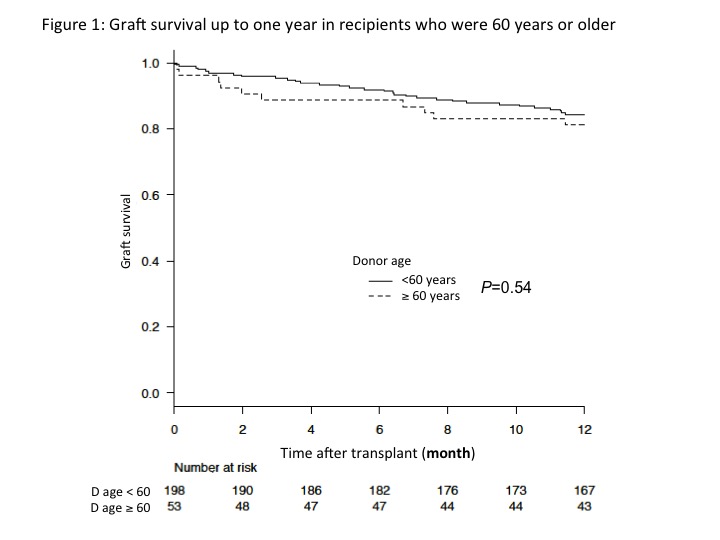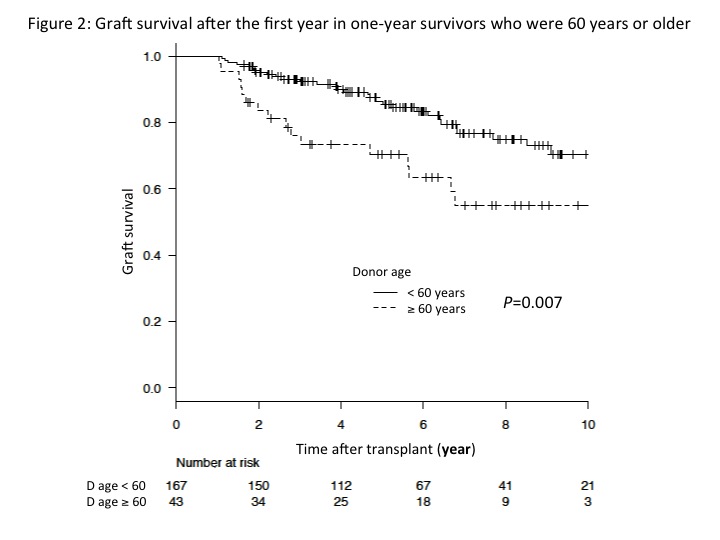Is It Safe to Use Older Donor Liver Grafts for Older Recipients?
Transplant and Hepatobiliary Surgery, Henry Ford Hospital, Detroit, MI
Meeting: 2017 American Transplant Congress
Abstract number: C203
Keywords: Age factors, Donors, Graft survival, Liver transplantation, marginal
Session Information
Session Name: Poster Session C: Organ Allocation, Meld Score, Organ Utilization, and Transplant Outcomes
Session Type: Poster Session
Date: Monday, May 1, 2017
Session Time: 6:00pm-7:00pm
 Presentation Time: 6:00pm-7:00pm
Presentation Time: 6:00pm-7:00pm
Location: Hall D1
Aim: The safety of liver transplantation (LT) using older donor grafts into older recipients remains to be elucidated. The aim of this study was to assess the impact of donor age on short- and long-term outcomes.
Methods: A total of 975 brain death donor LTs from 2000 to 2012 were reviewed. Older donors were defined as 60 years or older. Impact of donor age on short-term outcomes was assessed by one-year survival rates in the entire cohort. The subset of the one-year survivors was reviewed to assess the impact of age on long-term outcomes. Survival rates were compared by log-rank test, and risk factors were analyzed by Cox's regression model.
Results: There was no significant difference in one-year graft survival rate between the older (n=169) and younger donor (n=806) groups (P=0.09). In the older recipient group (60 years or older), one-year survival was not affected by donor age (P=0.54).  Among these one-year survivors (N=822), 5-year survival rates were 70% and 83% in the older (n=135) and younger donor (n=687) groups, respectively (P=0.001). The negative prognostic impact of older donor was most prominent in the group of recipients aged of 60 years old or older (P=0.007).
Among these one-year survivors (N=822), 5-year survival rates were 70% and 83% in the older (n=135) and younger donor (n=687) groups, respectively (P=0.001). The negative prognostic impact of older donor was most prominent in the group of recipients aged of 60 years old or older (P=0.007).  Older donor age did not have significant impact in the group of recipients aged between 40-59 years old (P=0.06) or less than 40 years old (P=0.71). On multivariate analysis, older donor (hazard ratio [HR]=2.24, P=0.009) and hepatitis C (HR=1.84, P=0.046) were considered to be independent risk factors for graft loss in one-year survivors who were 60 years old or older.
Older donor age did not have significant impact in the group of recipients aged between 40-59 years old (P=0.06) or less than 40 years old (P=0.71). On multivariate analysis, older donor (hazard ratio [HR]=2.24, P=0.009) and hepatitis C (HR=1.84, P=0.046) were considered to be independent risk factors for graft loss in one-year survivors who were 60 years old or older.
Conclusion: Older donor liver grafts may adversely affect long-term graft outcomes, particularly in recipients aged 60 years or older. The use of older donors into older recipients should be done with caution.
CITATION INFORMATION: Safwan M, Collins K, Takahashi K, Rizzari M, Yoshida A, Abouljoud M, Nagai S. Is It Safe to Use Older Donor Liver Grafts for Older Recipients? Am J Transplant. 2017;17 (suppl 3).
To cite this abstract in AMA style:
Safwan M, Collins K, Takahashi K, Rizzari M, Yoshida A, Abouljoud M, Nagai S. Is It Safe to Use Older Donor Liver Grafts for Older Recipients? [abstract]. Am J Transplant. 2017; 17 (suppl 3). https://atcmeetingabstracts.com/abstract/is-it-safe-to-use-older-donor-liver-grafts-for-older-recipients/. Accessed March 3, 2026.« Back to 2017 American Transplant Congress
